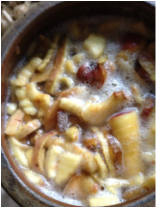 This last summer I was covered up with apple scraps. The leavings of two five-gallon white tubs of apples picked from the tree that grows next to the vegetable garden I tend. It was only a partial harvest, but it was enough to cause trouble. I knew what I was in for. Every time I have an apple tree in my life, peeling, coring, cooking, drying, repeat, repeat, repeat, takes over everything for a week or two, right about the same time that the tomatoes demand canning and freezing. As bags of dehydrated apples multiplied across my kitchen counter, so did heaps of apple core tubes and red curls of skin created by the hand-crank peeler borrowed from Steve (just like the one I sold at auction when I got rid of almost everything before moving to town). Some I cooked down into a nice apple bourbon jelly. But there a limit to how much jelly I want in my life, so I tried my hand at making apple scrap vinegar. Out on the shady front porch, in gallon pickle jars and an old crock, stinky apple scrap water frothed, bubbled, fermented and transformed into “must” and ultimately into the most exquisite apple cider vinegar I have ever tasted. The process invites in wild bacteria and puts it to good use. There are domesticated, predictable bacteria used commercially, and then there are the unruly, wild ones. In the air, all around us. Some good, some bad. We like the good. They are the power behind sour dough, beer, kimchi, wine, cheese, bourbon, sauerkraut, yogurt, and exotic kefir and kombucha. They fuel the transformation of kitchen scraps to black dirt in compost piles. We hate the bad. The Clostridium botulinum that causes botulism. The Corynebacterium diphtheriae that causes diphtheria. The Borrelia burgdorferi that causes Lyme disease. All of them are wild creatures equal in the eyes of nature. We try to keep our lives in narrow corrals, controlled and domesticated, predictable like commercial bacteria. But life is not that way. It is wild like the bacteria that swirl around us. And we fear the wild, the unknown, and the unforeseen. Yet it is this very Shiva of wildness, this destruction, fermentation, and transformation of the ordinary and predictable that is the froth of creativity and growth. It is in this wildness, when it appears in our lives, when it bursts open with strange and disruptive horrors, that we can find renewal. It is here when we are forced to drop the precious scraps of familiar, like piles of old cores and peels, to mutate into new, often better, versions of ourselves. I want to tell people when I hear them mourning the loss of what was, that this collapse can be glorious. That the breaking down of the dulling static opens the universe of the thrilling dynamic. That it is the most natural part of life. That a new form, refreshed by transformation and fermentation, is being offered. To look for that outstretched hand. But I don’t. I know they can’t hear me. The roar of disaster and grief too loud. Maybe I should just introduce some good wild into their lives. Small gifts of apple scrap vinegar, sauerkraut and kimchi. Loaves of sour dough bread. Or, of course, the traditional bottle of good bourbon.
2 Comments
Janet Helber-Parker
1/18/2015 12:46:33 pm
This is so good! I can relate as a gardener, and child of gardeners for generations back. We are familiar with the endless food preparation, and the storing it up for the winter. I like that sentence, "but it was enough to cause trouble." Thank heaven for that trouble. sounds like you keep pretty busy! Really can't wait to read your book! Congrats!
Reply
Claire Arbogast
1/20/2015 01:06:32 am
Thanks for your comment Janet.
Reply
Your comment will be posted after it is approved.
Leave a Reply. |
Inside
|

 RSS Feed
RSS Feed